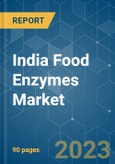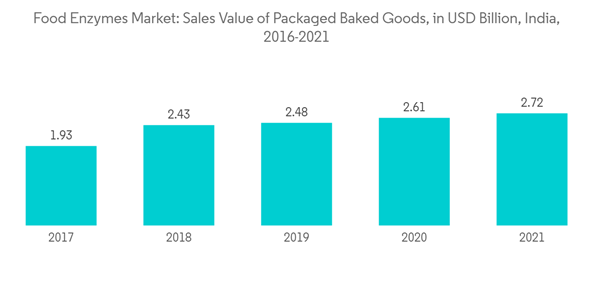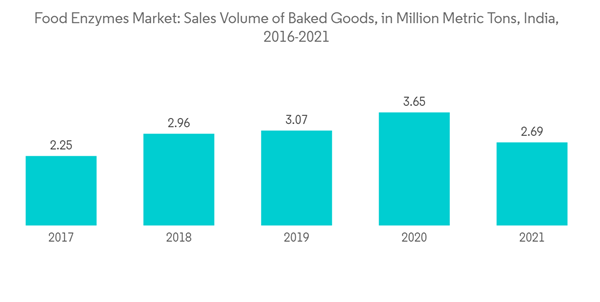The market is witnessing rapid growth due to the increasing demand for processed food in the country and the wide applications of enzymes in the processed food industry. Moreover, innovation in food technology in the country and increasing awareness about better-quality products being manufactured by utilizing enzymes are further driving the market. For instance, DSM has launched a new range of baking enzymes, specifically formulated for gluten-free applications, that improve the softness and moistness of bread. These enzymes are also used in further applications, such as corn tortillas, rye bread, and white bread. The rapid growth of India's food, beverage, and pharmaceutical industries has supported this expansion, and the demand for food enzymes is eventually expected to surpass the demand for industrial enzymes. The majority of these businesses either specialize in marketing or formulations of food enzymes. However, a small number of local and international businesses in India produce enzymes utilized in a variety of sectors, including the pharmaceutical and food processing industries. These businesses produce a range of enzymes as well as other environmentally friendly biological products. The availability of products and services is expanding quickly as the usage of enzymes becomes more accepted across the nation.
In the wine industry, cellulase is combined with other enzymes such as pectinase, which offers many advantages such as better quality and stability of the wine, clarification, color development, and improved maceration. According to Agriculture and Agri-Food Canada, India consumed roughly 34 million liters of wine in 2021. Out of this, the South Asian nation consumed approximately 18 million liters of light grape wine. Since a few years ago, the Indian wine industry has been growing quickly due to its health benefits and better distribution network. This is expected to help the carbohydrase enzyme segment grow over the next few years.
In the wine industry, cellulase is combined with other enzymes such as pectinase, which offers many advantages such as better quality and stability of the wine, clarification, color development, and improved maceration. According to Agriculture and Agri-Food Canada, India consumed roughly 34 million liters of wine in 2021. Out of this, the South Asian nation consumed approximately 18 million liters of light grape wine. Since a few years ago, the Indian wine industry has been growing quickly due to its health benefits and better distribution network. This is expected to help the growth of the carbohydrase enzyme segment over the next few years.
India Food Enzymes Market Trends
Rising Demand for Processed Food
The processed foods segment has witnessed a significant rise in the market in recent years, owing to changes in lifestyle patterns of consumers and a strong influence on the consumption of convenience foods. Since ancient times, enzymes have been utilized unwittingly in manufacturing, such as while creating bread. They can be obtained either through fermentation from microorganisms or extraction from plants or animals. Although they may contain various amounts of the other naturally occurring components of these three sources, they are typically refined. Food enzymes are typically added to foods to fulfill a technological need during food production, processing, preparation, and treatment. Enzymes are used to disassemble a fruit's structure so that producers can extract more juice or to convert starch into sugar in the production of alcohol. According to the India retail and e-commerce report, published by Unicommerce, India's food and grocery retail market had a value of USD 528.7 billion in the fiscal year 2022. As a result, the food enzymes market has expanded in tandem with the nation's food and beverage industry.One of the major factors driving the food additives market's growth is the rising demand for convenience and processed foods such as ready-to-eat foods, ready-to-drink beverages, snacks, frozen meals, and others. Consumers are demanding healthy food products along with variety in taste. Hence, several processed foods that are rich in fiber, protein, and calcium and are considered suitable for diabetic people are being marketed to attract more consumers. Functional properties, such as gluten-free, cholesterol-free, GMO-free, low-sodium, etc., are attributes of these products. Food and beverage enzymes are mainly produced from microbial sources because of their low cost and high productivity. The functional characteristics of food enzymes, such as digestion, softening, and anti-staling, are expected to drive the market's growth. There is a tremendous demand for bakery and dairy products, such as biscuits, bread, cakes, cheese, and yogurt. Notably, the bakery has the highest enzyme application in the country. Hence, the growth in processed food demand, owing to food retail chains’ growth and convenience, has invariably helped the increase in demand for enzyme application.
Acquisitive Demand for Enzymes in the Bakery Industry
The bakery segment has the highest enzyme application in the country, and its market is projected to grow in the forecast period. Also, in recent years, enzymes have assumed an even more significant role in baking due to restrictions on the use of chemical additives, especially in the manufacture of bread and other fermented products. Furthermore, focusing on the bakery enzyme for gluten-free products is the key area of the company's new product developments. Also, the wide range of applications of food enzymes, such as the preservation of the freshness, safety, taste, appearance, and texture of processed foods, have been propelling the market. Enzymes, such as asparaginase, help reduce the toxic acrylamide content in bakery products, while some enzymes act as anti-staining agents in bread and cakes and increase the product's shelf life. Furthermore, manufacturing and exports of bakery products from India have increased in recent years, paving the way for the food enzyme market to expand across the country. For instance, according to UN Comtrade data, the export value of bakery products increased from USD 346.86 million in 2020 to USD 407.64 million in 2021. Hence, the increase in demand for bakery products has consistently helped the rise in demand for enzyme applications.India Food Enzymes Market Competitor Analysis
The food enzymes market in India is naturally competitive, with a large number of domestic and multinational players competing for market share. The major players typically use corporate strategies such as product innovation, mergers, and acquisitions in order to strengthen their presence in the market studied. Focus on bakery enzymes for gluten-free products, digestive enzymes for dietary supplements, and dairy enzymes are the key focus areas of the company's new product development. Key players dominating the country's market include Koninklijke DSM N.V., Novozymes A/S, Advanced Enzyme Technologies Limited, Lumis Biotech Pvt. Ltd., and International Flavors & Fragrances.Additional benefits of purchasing the report:
- The market estimate (ME) sheet in Excel format
- 3 months of analyst support
This product will be delivered within 2 business days.
Table of Contents
Companies Mentioned (Partial List)
A selection of companies mentioned in this report includes, but is not limited to:
- Koninklijke DSM N.V.
- Novozymes A/S
- Advanced Enzyme Technologies Limited
- Lumis Biotech Pvt. Ltd.
- International Flavors & Fragrances
- Kerry Group PLC
- Noor Enzymes
- Nature BioScience Pvt. Ltd.
- Maps Enzymes Ltd.
- Infinita Biotech Private Limited










